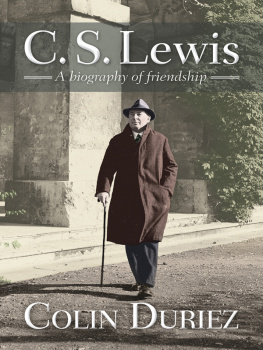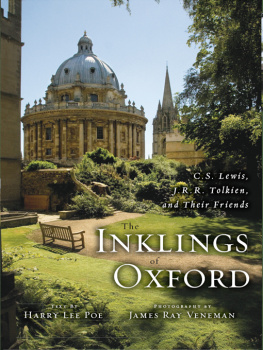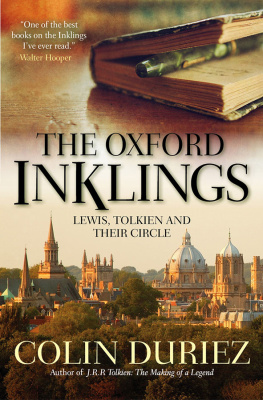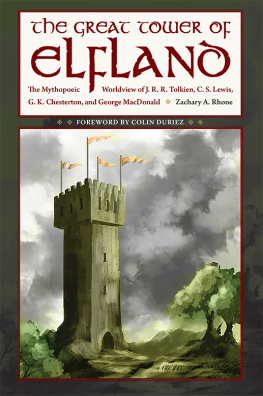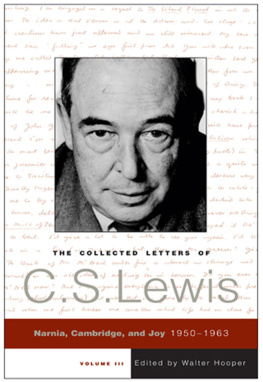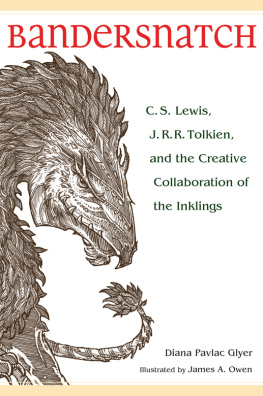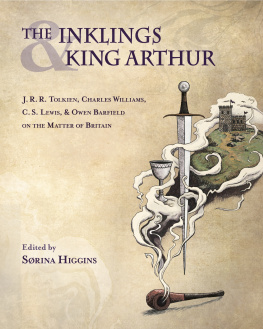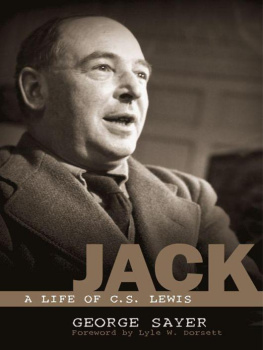A WELL of
WONDER
ESSAYS ON C. S. LEWIS,
J. R. R. TOLKIEN,
AND THE INKLINGS
Clyde S. Kilby
Edited by Loren Wilkinson and Keith Call

For Clyde S. Kilby, with gratitude

2016 First Printing
A Well of Wonder: Essays on C. S. Lewis, J. R. R. Tolkien, and The Inklings
Copyright 2016 by Marion E. Wade Center, Wheaton College, Wheaton, Illinois
ISBN 978-1-61261-862-3
Library of Congress Cataloging-in-Publication Data is available
Names: Kilby, Clyde S., author. | Wilkinson, Loren, editor.
Title: A well of wonder : essays on C.S. Lewis, J.R.R. Tolkien, and the Inklings / Clyde S. Kilby ; edited by Loren Wilkinson and Keith Call.
Description: Brewster MA : Paraclete Press Inc., 2016.
Identifiers: LCCN 2016035753 | ISBN 9781612618623 (volume 1 : hard cover)
Subjects: LCSH: Christianity. | Theology. | Christian literature. | Christianity and literature. | Lewis, C. S. (Clive Staples), 1898-1963. | Tolkien, J. R. R. (John Ronald Reuel), 1892-1973. | Inklings (Group of writers)
Classification: LCC BR96 .K43 2016 | DDC 230.092/241dc23
LC record available at https://lccn.loc.gov/2016035753
10 9 8 7 6 5 4 3 2 1
All rights reserved. No portion of this book may be reproduced, stored in an electronic retrieval system, or transmitted in any form or by any meanselectronic, mechanical, photocopy, recording, or any otherexcept for brief quotations in printed reviews, without the prior permission of the publisher.
Published by Paraclete Press
Brewster, Massachusetts, and Barga, Italy
www.paracletepress.com
Printed in the United States of America
CONTENTS
, by Luci Shaw |
, by Loren Wilkinson |
C. S. LEWIS ON THEOLOGY AND THE
WITNESS OF LITERATURE |
J.R.R. TOLKIEN ON STORY AND
THE POWER OF MYTH |
THE INKLINGS AS SHAPERS OF A NEW
CHRISTIAN IMAGINATION |
by Loren Wilkinson |
A Tribute to Clyde S. Kilby
It is a time when apples ripen,
friendships thicken,
maples kindle a fall fire
west of Blanchard. Through the halls
scholars and students quicken
at a familiar voice,
and on the corner of Washington and Jefferson
squirrels and sparrows rejoice
because youre home. Like a hobbit
come back to the Shire
youre home again, our friend,
bringing Martha with you, and sunflower
seeds, a sackful of nuts, three score
years and ten worth of wisdom, under
your armletters and Lewis-lore
your mind a well of wonder.
It was your mind, your inner eye, that
saw it long before it happened
the hierarchy of shelves
dusted obliquely by the late sun
behind old glass in the narrow room once occupied
by a minority of one
and now inhabited by Inklings and Elves.
Like a gardener raking grass,
piling the bright and varied leaves,
from far you gathered treasure, sheaves
of manuscripts, papers ornamented
with the rich, crabbed, English script,
searched out the volumes
burnished and precious with
scholarship and age
fact shrunk to truth speaking
from every page.
Then you swung open for us all
the wardrobe door,
pushed us farther up and farther in
(accompanied by some favorite talking beast)
to Middle-earth, Narnia, and the Utter East.
In there, for us to re-explore,
is perfect Perelandra.
Treebeard is growing up the cornered wall.
In the Deep Space behind the rows of books
eldila elude us; Curdie
encounters Mr. Bultitude the bear.
There in that room
we smell the past, untainted by decay or death
but fragrant, for in there
the mallorns bloom
and all the blessed air
is warm with Aslans breath.
Luci Shaw
Introduction

CLYDE S. KILBY: THE MAN WHO REOPENED THE DOORS TO WONDER
LOREN WILKINSON
In the poem to Clyde Kilby that stands as an epigraph to this collection of his writings, Luci Shawone of many writers and scholars who received early encouragement from Dr. Kilbyuses two metaphors to describe the kind of experience this remarkable scholar and teacher provided for many of his students. The first is of a doorkeeper, an allusion to the imaginative entrance to the world C. S. Lewis created in The Chronicles of Narnia.
Then you swung open for us all
the wardrobe door,
pushed us farther up and farther in.
The second picture is of the man as a deep well, returning with his wife, Martha, after a summer in England, bringing
three score
years and ten worth of wisdom, under
your armletters and Lewis-lore
your mind a well of wonder.
As we prepared this book and its companion volume, The Arts and the Christian Imagination: Essays on Art, Literature, and Aesthetics, which includes Kilbys writings on these topics, we invited many of his former students to write of his influence on them. Many of them responded with similar language. Mark Noll also sees Kilby as a doorkeeper. For a whole generation of American evangelicals, says Noll, Kilby opened a wardrobe onto a land of wonder where the Lion stalked. Tom Howard continues the metaphor in describing the effect of taking Kilbys class in Romantic poetry: He threw open the shutters.... He pointed to the things that troubled the very marrow in ones bones, but for which one never had the vocabulary to summon into visibility.
In the dedication of his first book, Christ the Tiger, Howard uses the language of seeing: For Dr. Kilby, who took my arm and said, Look. Leanne Payne continues the metaphor. Speaking of the blindness resulting from a common kind of reductive modern analysis, Payne says, He came against this blindness in all of his courses, and his bright students, heavy into analysis and sorely introspective, dropped their blinders, looked up, and began to see. The poet Jeanne Murray Walker uses a different picture: I praise him for being a liberator. Dick Taylor, a historian with the Illinois State Historical Society, sums up Kilbys effect on him in a seminar in life writing: I cant remember a thing he taught me about writing biography, but my experience in that class changed my life forever.
As this small sampling of comments makes plain, Clyde S. Kilby was, for many students, an extraordinary teacher. It is with that fact, rather than with his early, long, and effective championing of writers like Lewis and Tolkien, that I must begin in introducing this collection of his writings on those makers of modern mythology (as he called it). Kilbys greatness was not simply the result of his influence from, or defense of, Lewis, Tolkien, and friends; rather he turned to them (and turned many others to them) because they expressed a truth about God and creation that he had already come to know.
That truthwhich kept filling and refilling that well of wonder which was Dr. Kilbys lifewas the fact that the whole of created reality is the miraculous gift of a loving, personal, and ever-present Creator. And this was not just a propositional truth intellectually known: it was lived, experienced, and shared. Often it was experiencedand expressedthrough the apparently trivial or insignificant. Several of his former students, for example, mention Dr. Kilbys love for the dandelion, and Marilee Melvin recalls his bringing a drooping dandelion to class and asking, in a voice filled with awe, how many of you believe that the Lord God made


